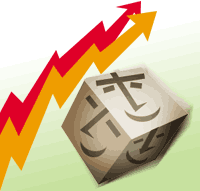|
|
| Help | |
| You are here: Rediff Home » India » Get Ahead » Money » Invest |
|
| |||||||||||||||||||||||
|
| |||||||||||||||||||||||
 veryone wants a piece of the stock market. And why not?
veryone wants a piece of the stock market. And why not?
But do you know how shares reward an investor?
If you are a shareholder, there are two ways you can benefit from the profits of a company: capital appreciation or dividend. Read on to understand how shares reward you.
 Dividends, dividends!
Dividends, dividends!
Usually, a company distributes part of the profit it earns as dividend.
Say a company earned a profit of Rs 1 crore (Rs 10 million) in 2004-05.
It keeps half that amount within the company. This is used for a variety of purposes -- buying more machinery, land or raw materials, building a new factory or setting up a new office. It could even be used to repay loans.
The other half is to be distributed as dividend.
Assume the company has 10,000 shares. This would mean half the profit -- ie Rs 50 lakh (Rs 5 million) -- would be divided by 10,000 shares.
So each share would earn Rs 500. The dividend would then be Rs 500 per share.
If you own 100 shares of the company, you get a cheque of Rs 50,000 (100 shares x Rs 500) from the company.
I have never got such a high dividend!
Let's retract a bit. When the company issues shares, it gives a basic value to each share -- say Rs 10. This is called the face value of the share.
When the share is traded at the stock market, however, this value may go up or down, depending on the supply and demand for the stock.
The value of a share in the market at any point of time is called the price of the share or the market value of a stock.
A share with a face value of Rs 10, may be quoted at Rs 55 (higher than the face value), or even Rs 9 (lower than the face value).
Companies often decide to give the dividend as a percentage. So the company can declare a dividend of 50%. This dividend is a percentage of the share's face value.
This means if the face value of your share is Rs 10, a 50% dividend would mean a dividend of Rs 5 per share.
But chances are you would not have paid Rs 10 (the face value) for the share.
Let's say you paid Rs 100 (the then market value). But you will only get Rs 5 as your dividend for every share you own.
That, in percentage terms, means you got just 5% percent as your dividend and not the 50% the company announced.
Let's say you paid Rs 9 (the then market value). You will still get Rs 5 per share as dividend. That means, in percentage terms, you got 55.55% as dividend yield and not the 50% the company announced.
It all depends on how much you paid for the shares.
There is money in holding and selling
When you buy the shares of a company, you invest in its business. As the company expands and grows and profits increase, its value increases.
This, in turn, drives up the value of the stock. So when you sell, you will receive a premium over (more than) what you paid.
It is not as easy as it sounds. A stock's price is always on the move. It could either appreciate (increase in value) or depreciate (decrease in value) with respect to the price at which you purchased it.
If you buy a stock for Rs 10 and sell it for Rs 20 after a year, your return from that stock is Rs 10, or 100%.
Or if you buy a stock for Rs 10 and sell it for Rs 9, you lose Re 1, or your loss is 10%.
You have to look at both
If you buy a stock for Rs 10 and sell it for Rs 20 after a year, your return from that stock is Rs 10 or 100%.
Now add the Rs 5 per share you have received as dividend.
Your total return will be Rs 15 (Rs 10 + Rs 5) or 150% (Rs 15 / by Rs 10 x 100).
If you buy a stock for Rs 10 and sell it for Rs 9 after a year, you would lose Re 1 per share.
However, you would have got Rs 5 as dividend. So you would net Rs 4 as earnings from the company.
In percentage terms, your return would be 40% (Rs 4 / Rs 10 x 100).
The tax factor
There is no tax on dividend.
When you sell any asset you own (house, land, shares, mutual fund units, gold, debentures, bonds), and you make a profit on the sale, it is known as capital gain.
If you sell your shares after a year, the profit you make is referred to as long-term capital gain. There is no tax on long-term capital gain.
If you sell it within a year of buying, it is referred to as short-term capital gain and taxed at 10%.
On a closing note
It is purely up to the company's discretion whether or not to declare a dividend and how much it should be. Normally, the dividend earnings do not amount to much.
People make their money in shares via capital appreciation. This means the share value rises over time and can be sold at a profit.
That is why shares are a long-term investment of at least a few years. From the tax angle, too, it pays to invest for the long-term.
Do remember that you are investing in a business. And businesses do fail. Shares are a risky investment!
Illustration: Dominic Xavier
|
|
| © 2008 Rediff.com India Limited. All Rights Reserved. Disclaimer | Feedback |